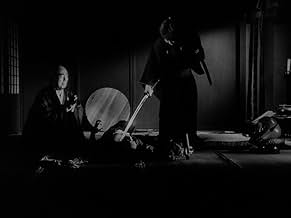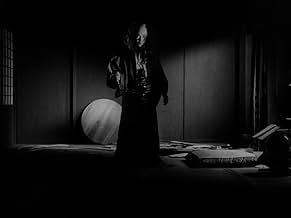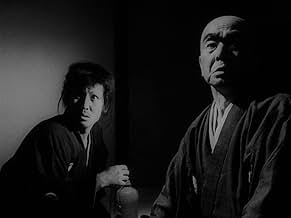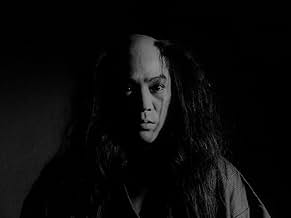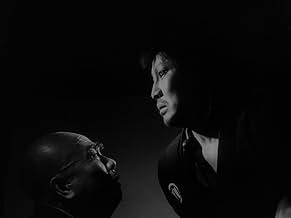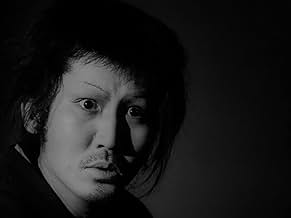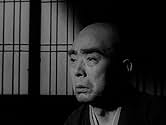IMDb-BEWERTUNG
7,9/10
3256
IHRE BEWERTUNG
Füge eine Handlung in deiner Sprache hinzuAfter being robbed by a geisha, a ronin warrior carves a bloody path to seek revenge.After being robbed by a geisha, a ronin warrior carves a bloody path to seek revenge.After being robbed by a geisha, a ronin warrior carves a bloody path to seek revenge.
- Regie
- Drehbuch
- Hauptbesetzung
Empfohlene Bewertungen
The only possible parallel I can furnish to position SHURA in the greater map of Japanese cinema is the last 20 minutes of that soul-destroying masterpiece Kihachi Okamoto directed in 1966, the indomitable SWORD OF DOOM. And even that comparison leaves a little something to be desired. Not only because SHURA is an exhausting 2+ hours of that same brooding sludge so thick you could slice it with a wakizashi, but also because, directed as it is by experimental guerilla rebel Toshio Matsumoto, it stands as a somewhat different beast from the general hobnob of genre cinema.
Woven of that same tragic almost Shakespearian fabric, with a protagonist who like Ryunosuke Tsukue in SWORD OF DOOM finds himself doomed to walk the path of demons in a downward spiral into madness and despair, SHURA is as bleak dark and hopeless a jidaigeki as was ever execrated and sealed from man and beast on celluloid. Unlike Ryunosuke Tsukue, however, who starts on the Great Buddha Mountain Pass and slowly cuts his way into his own private hell, Gengobe in SHURA starts in that private hell and plunges himself deeper in depths of the soul unknown. The movie opens with Gengobe hunted in pitch black by hovering lanterns held by unseen persecutors. He enters a house and finds a scene of carnage and mayhem, the floor strewn with mutilated bodies, limbs, others hanging dead from the ceiling. I told you it only starts there.
The movie itself exists in a hopeless purgatory. No establishing shots of anything. No daytime. The passage of time signaled with intertitles. The occasional external shot, a patch of gravel road, the frontside of a house, offers no relief, no room for breath, because it reminds us that there are no horizons or depth for the eye to rest. Everything was probably shot on soundstages with only a few lights strategically placed hither and thither, no doubt a lingering remnant of kabuki theater from which Japanese cinema has borrowed heavily. With no broader world to be measured against, the interiors and the story that takes place inside and the characters that breathe and walk and double-cross and slaughter each other in them, all seem to hover suspended in absolute suffocating darkness and everlasting night.
The title really says it all. The Ashuras, a rank of lower demigods in Buddhism, are meant to reflect the mental state of a human being obsessed with force and violence, always looking for an excuse to get into a fight, angry with everyone and unable to maintain calm or solve problems peacefully.
It's not only cynic or tragic as the best of jidaigekis usually are, it's positively bleak and unremitting. That shots and entire scenes repeat themselves automaton-like, first taking place inside the protagonist's anguished mind and then reality, only serves to reinforce the existential phlegm through which SHURA wades waist-deep for two hours. The atmosphere is so oppressing that questions of clunky expositional dialogue such as the characters often spout ("this is your wife's head" says a character while brandishing said head in plain sight) and theatrical exaggerated acting are rendered almost meaningless.
The story is still good, gripping, engrossing, as classic and plain and stripped of all fat as the best jidaigekis usually are, with a limited cast and sets that hint at the stageplay origins of the script, but in the end it's the overarching feeling of despair that stays with you. A movie so much of its time and place, almost impossible to even think of it as coming from anywhere else than Japan of the late 60's-early 70's, that will by its very nature appeal only to a limited audience. If you came this far and liked what you read then you're probably ready to brave SHURA. Beware all who enter. There is real cacodemonia here.
Woven of that same tragic almost Shakespearian fabric, with a protagonist who like Ryunosuke Tsukue in SWORD OF DOOM finds himself doomed to walk the path of demons in a downward spiral into madness and despair, SHURA is as bleak dark and hopeless a jidaigeki as was ever execrated and sealed from man and beast on celluloid. Unlike Ryunosuke Tsukue, however, who starts on the Great Buddha Mountain Pass and slowly cuts his way into his own private hell, Gengobe in SHURA starts in that private hell and plunges himself deeper in depths of the soul unknown. The movie opens with Gengobe hunted in pitch black by hovering lanterns held by unseen persecutors. He enters a house and finds a scene of carnage and mayhem, the floor strewn with mutilated bodies, limbs, others hanging dead from the ceiling. I told you it only starts there.
The movie itself exists in a hopeless purgatory. No establishing shots of anything. No daytime. The passage of time signaled with intertitles. The occasional external shot, a patch of gravel road, the frontside of a house, offers no relief, no room for breath, because it reminds us that there are no horizons or depth for the eye to rest. Everything was probably shot on soundstages with only a few lights strategically placed hither and thither, no doubt a lingering remnant of kabuki theater from which Japanese cinema has borrowed heavily. With no broader world to be measured against, the interiors and the story that takes place inside and the characters that breathe and walk and double-cross and slaughter each other in them, all seem to hover suspended in absolute suffocating darkness and everlasting night.
The title really says it all. The Ashuras, a rank of lower demigods in Buddhism, are meant to reflect the mental state of a human being obsessed with force and violence, always looking for an excuse to get into a fight, angry with everyone and unable to maintain calm or solve problems peacefully.
It's not only cynic or tragic as the best of jidaigekis usually are, it's positively bleak and unremitting. That shots and entire scenes repeat themselves automaton-like, first taking place inside the protagonist's anguished mind and then reality, only serves to reinforce the existential phlegm through which SHURA wades waist-deep for two hours. The atmosphere is so oppressing that questions of clunky expositional dialogue such as the characters often spout ("this is your wife's head" says a character while brandishing said head in plain sight) and theatrical exaggerated acting are rendered almost meaningless.
The story is still good, gripping, engrossing, as classic and plain and stripped of all fat as the best jidaigekis usually are, with a limited cast and sets that hint at the stageplay origins of the script, but in the end it's the overarching feeling of despair that stays with you. A movie so much of its time and place, almost impossible to even think of it as coming from anywhere else than Japan of the late 60's-early 70's, that will by its very nature appeal only to a limited audience. If you came this far and liked what you read then you're probably ready to brave SHURA. Beware all who enter. There is real cacodemonia here.
Demons is an adaptation of Tsuruya Namboku's play Kamikakete Sango Taisetsu, a kabuki theater classic based on an episode of the 47 rônins. It goes deeper, darker and crueler, than any other samurai movies I've seen. its pure malice. And thrives on diabolical suspense. Its a mans journey through hate and revenge, and his descent into madness, it is slow, painful and bloody. A remarkable exercise in cynical nihilism that is so breathtakingly grim that it becomes undeniably compelling. Along with Katsuo Nakamura's haunting performance in the lead role.
The story is not realistic. The setting and the intruducing course of action is undoubtly surreal, and almost every character in Demons is unsympathetic and devious with the possible exception of Hachiemon, who is so selfless in his sacrifices for his master that he becomes annoyingly obsequious. But thats part of the films appeal.
Matsumoto adopts an expressionist aesthetic similiar to the theatrical- play. And the editing accumulates false starts and several scenes are repeated almost identically, first dreamed then in real life. This can be very confusing and it creates incessant ruptures which breaks the narrative fluidity.
Demons is not perfect but its appeal is one you rarely see in cinema, and, of course, it has an extrodinary story and directing which thus class thus as one of world-cinemas timeless gems.
The story is not realistic. The setting and the intruducing course of action is undoubtly surreal, and almost every character in Demons is unsympathetic and devious with the possible exception of Hachiemon, who is so selfless in his sacrifices for his master that he becomes annoyingly obsequious. But thats part of the films appeal.
Matsumoto adopts an expressionist aesthetic similiar to the theatrical- play. And the editing accumulates false starts and several scenes are repeated almost identically, first dreamed then in real life. This can be very confusing and it creates incessant ruptures which breaks the narrative fluidity.
Demons is not perfect but its appeal is one you rarely see in cinema, and, of course, it has an extrodinary story and directing which thus class thus as one of world-cinemas timeless gems.
'Shura' also known as 'Demons' or 'maybe even better known as 'Pandemonium' is second feature by great experimenter Toshio Matsumoto. It is one of the most experimental samurai films I have ever seen, and one of the most disturbing revenge stories. The film begins with colorful sun setting to transform into bleak black and white cinematography. After a geisha deceives a samurai and robs him together with her husband, the samurai starts the bloody and twisted path of revenge that unravels many secrets and treats the viewer with such twists that makes M. Night Shyamalan go green with jealousy. The film is cool mixture of classic samurai movies and film-noir with the tasty sauce of Matsumoto's experimental techniques. More straightforward and less surreal than the director's better known 'Funeral Parade of Roses'.
I don't know that there's anything in this movie which blew me away, but there was also nothing which bothered me either. I suppose the plot is a fairly straightforward revenge story, but the stylistic elements of the film were more than enough to save the film. For instance, I liked the usage of darkness and shadows in several scenes. I don't know if I can quite put my finger on why those elements work, but something about seeing various characters appear/disappear from the shadows gives the film a dreamy aesthetic. I also liked how certain scenes were repeated. Through these scenes, you get a sense of Gengobei imagining how he wants to behave in certain situations or how some of the violence he commits or witnesses it etched into his head. These scenes also cause the film to become a subjective experience which puts you in Gengobei's headspace really well. Finally, the high level of violence also surprised me. While certain elements like the slow motion and the (relatively) high levels of blood help in this regard, that most of the deaths are prolonged gives them even more staying power. All things considered, this is definitely the most violent classic samurai film I've seen. As I said at the start of this review, I wouldn't say this film blew me away, but I do have a lot of respect for the film's technical qualities. It's a stylistically impressive take on the revenge film which is so unique with its craft that you eventually stop caring about its somewhat barebones plot.
A stark, desperate tale of vengeance, Shura examines the plight of Gengobe - a Ronin (Samurai without Master) - and his quest to right the wrongs done unto him. This is basically the whole plot in a nutshell, but this isn't any kind of action adventure story or pulp fiction Samurai epic, rather a philosophical and meditative examination of manipulation and a misguided affection which blinds a man from his duty and true quest. True this is a staple of Japanese cinema - but it is one which has rarely been examined quite this painfully and as unflinchingly as it is in this film.
The theatrical origins of Matsumoto's film are very evident from the onset of this bleak piece, an extremely minimalist affair, but this only adds to the feeling of entrapment and claustrophobia. Daylight is glimpsed only once (the first shot as the sun sinks from the blood-red sky - also the only shot in colour) and the story plays out over the course of several nights.
As with his previous film 'Funeral Parade of Roses' Matsumoto employs many times a 'dual reality' device replaying scenes first as the protagonist imagines, and then as it actually happens, constantly keeping the viewer unsettled, with shocking - though never gratuitous - spurts of violence which one is torn between finding sympathy with and being repulsed by.
This is a film which is easier to admire than to actually like, but it's forlorn, doomed and - literally - lightless vision means it could only be truthfully recommended to those who are fans of truly downbeat cinema. A viciously dark night of the Soul.
9/10. 1 point deducted for not showing even the slightest glimmer of hope.
The theatrical origins of Matsumoto's film are very evident from the onset of this bleak piece, an extremely minimalist affair, but this only adds to the feeling of entrapment and claustrophobia. Daylight is glimpsed only once (the first shot as the sun sinks from the blood-red sky - also the only shot in colour) and the story plays out over the course of several nights.
As with his previous film 'Funeral Parade of Roses' Matsumoto employs many times a 'dual reality' device replaying scenes first as the protagonist imagines, and then as it actually happens, constantly keeping the viewer unsettled, with shocking - though never gratuitous - spurts of violence which one is torn between finding sympathy with and being repulsed by.
This is a film which is easier to admire than to actually like, but it's forlorn, doomed and - literally - lightless vision means it could only be truthfully recommended to those who are fans of truly downbeat cinema. A viciously dark night of the Soul.
9/10. 1 point deducted for not showing even the slightest glimmer of hope.
Wusstest du schon
- WissenswertesIncluded among Letterboxd's Top 250 Horror Films.
Top-Auswahl
Melde dich zum Bewerten an und greife auf die Watchlist für personalisierte Empfehlungen zu.
- How long is Demons?Powered by Alexa
Details
- Laufzeit
- 2 Std. 14 Min.(134 min)
- Farbe
- Sound-Mix
- Seitenverhältnis
- 1.37 : 1
Zu dieser Seite beitragen
Bearbeitung vorschlagen oder fehlenden Inhalt hinzufügen

